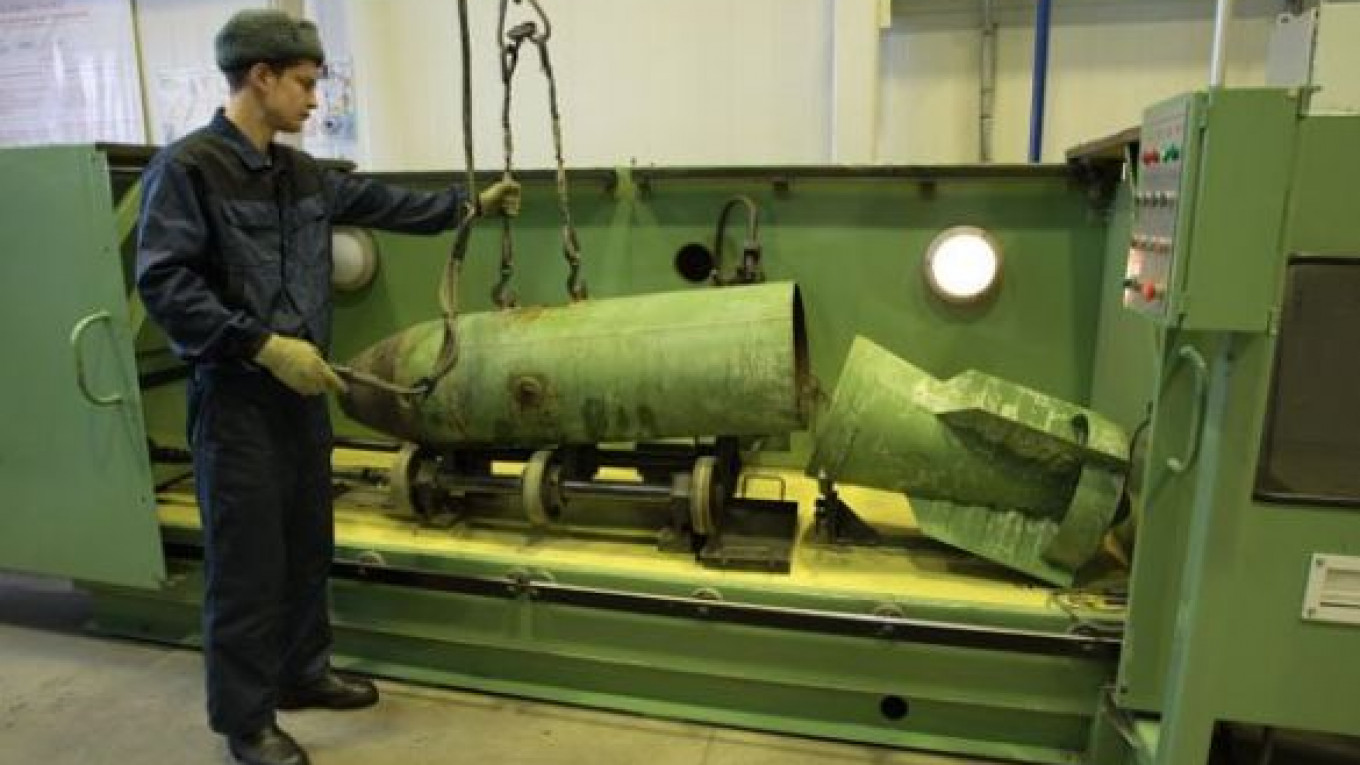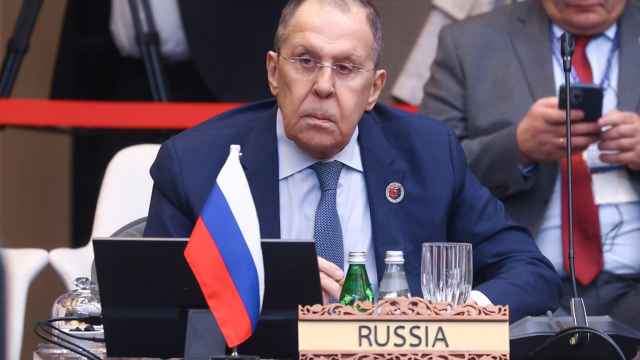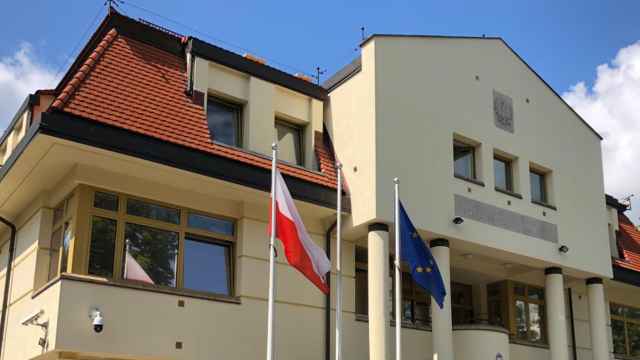News that Moscow wants to end a multibillion-dollar program with Washington to dismantle nuclear and chemical weapons triggered fears Thursday that the Kremlin is embarking on an increasingly isolationist foreign policy course.
The Foreign Ministry said late Wednesday that the United States wants to prolong the so-called Nunn-Lugar program, which expires next year, but that it believes the agreement is outdated in its current form.
"[Our] American partners know that their offer is not in accordance with our ideas about … future cooperation. For this, a different and more modern legal framework is needed," the ministry said in a on its website.
The Nunn–Lugar Cooperative Threat Reduction Program, which is named after U.S. Senators Sam Nunn and Richard Lugar, funds safety enhancement efforts at nuclear weapons sites, the dismantling of nuclear submarines and the elimination of chemical weapons. Since its inception in 1992, the program has funneled some $5 billion in U.S. taxpayers' money to Russia, according to the Foreign Ministry.
Russian officials now say they dislike the program because it reduces the country to aid recipient status.
"We are not satisfied with this agreement, especially given the new realities of the changed situation in Russia, including the fact that our financial capabilities are now substantially bigger," Deputy Foreign Minister Sergei Ryabkov told Interfax on Wednesday.
He added that Moscow wants a new arrangement to treat it fairer. "We are interested in a normal, peer-to-peer collaboration that benefits both sides," he said.
However, U.S. officials were adamant that they want to see Nunn-Lugar carried on. "Maybe it will take on another format, but in substance the cooperation will continue,"Ambassador Michael McFaul told Interfax on Wednesday.
Lugar himself said Wednesday that his understanding was that Moscow just wanted to change the program. During talks in Moscow in August, Foreign and Defense Ministry officials showed "a desire to make changes," but at no time did they indicate that "they were intent on ending it, only amending it," Lugar, a Republican from Indiana, said in a on his website.
He added that during his visit to a missile dismantlement facility in Surovatikha in the Nizhny Novgorod region, Federal Space Agency officials welcomed prospects for future work. "There are several more missiles we could work on this year at the [facility], all of them capable of carrying multiple warheads with hundreds of kilotons of nuclear yield," he said.
Experts linked the move to the Kremlin's recent policy of opting out of international aid and development programs.
On Oct. 1, USAID had to close its operations in the country after the Foreign Ministry accused Washington's biggest development agency of political interference.
Earlier this week, the ministry said it had given UNICEF, the United Nations children's agency, until the end of the year to wrap up its existing programs in Russia. In both cases, the ministry argued that Russia should no longer act as a recipient of aid but as a donor.
Critics have said those cancellations damage many domestic organizations that have to look for domestic funding, which is harder to get and often scarce.
The Foreign Ministry's Nunn-Lugar decision elicited similar criticism. "Declarations of self-sufficiency to dispose of ammunition sound good in light of the explosion of thousands of shells in the Orenburg region," a Vedomosti editorial said Thursday.
Four kilotons of munitions, including Uragan missiles, exploded at an Army base in the Urals region Tuesday. Prosecutors later said the blasts were caused by soldiers' cigarettes.
Ryabkov, the deputy foreign minister, denied that Nunn-Lugar could be linked to aid cooperation. He told Interfax that the government had already mulled opting out in 2006, when the agreement was last up for prolongation. He also said most of the program had already been fulfilled.
Analysts said Thursday that the Kremlin’s stance on the program reflected similar trade-offs as with USAID. “On the one hand, there is a clear will to end dependence from the U.S., especially in the defense sector. On the other hand, there are benefits from receiving more money,” said Alexander Khramchikhin of the Institute of Political and Military Analysis.
Khramchikhin also dismissed fears that the program gives Washington too much access to sensitive information. "Real secrets are divulged only by treason or stupidity," he said.
Even some Defense Ministry officials admitted that they liked the Nunn-Lugar program. "If it will not be prolonged, we will have to find new funding that does not exist because there are no provisions for this in the state arms program," a ministry source told Kommersant.
Pyotr Topychkanov, an analyst with the Carnegie Moscow Center, said that prolonging the program was unlikely because Moscow wants to move from bilateral to multilateral nuclear safety agreements.
"They will try to welcome Britain, France and China in those talks," he said by telephone.
Topychkanov also offered a positive assessment of Nunn-Lugar by saying that ending it now was a sign that the country's nuclear safety standards were high.
"If the current leaders believe they need no more U.S. support, this means that we have achieved good results," he said.
He added that Moscow could probably project a new nuclear security program to countries like Pakistan, India and Vietnam.
Related articles:
A Message from The Moscow Times:
Dear readers,
We are facing unprecedented challenges. Russia's Prosecutor General's Office has designated The Moscow Times as an "undesirable" organization, criminalizing our work and putting our staff at risk of prosecution. This follows our earlier unjust labeling as a "foreign agent."
These actions are direct attempts to silence independent journalism in Russia. The authorities claim our work "discredits the decisions of the Russian leadership." We see things differently: we strive to provide accurate, unbiased reporting on Russia.
We, the journalists of The Moscow Times, refuse to be silenced. But to continue our work, we need your help.
Your support, no matter how small, makes a world of difference. If you can, please support us monthly starting from just $2. It's quick to set up, and every contribution makes a significant impact.
By supporting The Moscow Times, you're defending open, independent journalism in the face of repression. Thank you for standing with us.
Remind me later.







